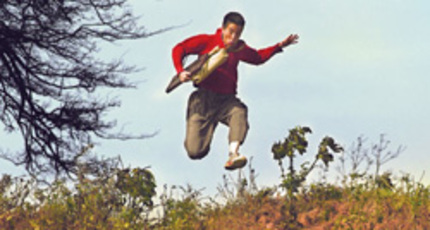TIFF Report: The Sun Also Rises

In his movie The Sun Also Rises director/actor Jiang Wen weaves four stories together with Chinese culture and personal passion over a period of twenty years. The story starts with a young man and his seemingly mad mother in rural China. The second tale involves two friends, teachers at a university, and their tragic relationship with an exotic and sensual doctor. The third tale starts to reveal the connections when one of the teachers and his wife come to the village where the young man lives. The fourth tale then retreats back twenty years to reveal how all these souls have been connected by a night at the railroad tracks.
You would be hard pressed to find films that weave such a rich and visual tapestry as The Sun Also Rises. Jiang Wen shoots beautiful film. The sequence of events at the university is truly inspired and includes one of the most impressive looking foot chases ever captured on celluloid. Every frame is rich in color and texture. Nothing is wasted. It also boasts a terrific performance from Anthony Wong as the ill-fated teacher Liang. Joan Chen as Doctor Lin simply oozes sexuality in every frame. The university sequence is the most entertaining and accessible of the four interwoven tales in this movie; the other sequences cannot match its inspiration.
The first sequence between the mother, actress Zhou Yun, and her only son, Jaycee Chan in a surprisingly good role, is at times a bit unclear and abstract. Having this as your opening sequence certainly sets the tone of the film and the viewer’s response to it will dictate how the rest of the film will be perceived. Following it with the university sequence though does settle any concerns about Jiang Wen’s non-linear narrative and it does ground the story by the time it is through. The third sequence in the narrative finds Jiang Wen’s character Tang and his wife in the village of the son. Frightened out of expressing passion and emotion Tang no longer attends to his wife’s desires, instead he spends his time with the younger boys of the village hunting. Separated from her husband emotionally she turns to someone to have her needs met, a moment of passion that is ill-fated. The fourth tale will bring Wen’s narrative together as a whole as two women look for their husbands in the desert.
Film is always open to interpretation and one helmed in such a style as Jiang Wen’s can create many. When I look at The Sun Also Rises I see a people that were discouraged from feeling and expressing emotion, be it all through tragic circumstances or simply overcome by human desire. Loss and death would cause many of the characters to retreat inside themselves and discourage from doing anything emotionally. But we are emotional and passionate creatures and when we cannot find one place we will find it in another and that always brings about consequences as well. Love and emotion doesn’t always have to hurt but when it does, retreating into ourselves or to others doesn’t mean the pain will go away either.







